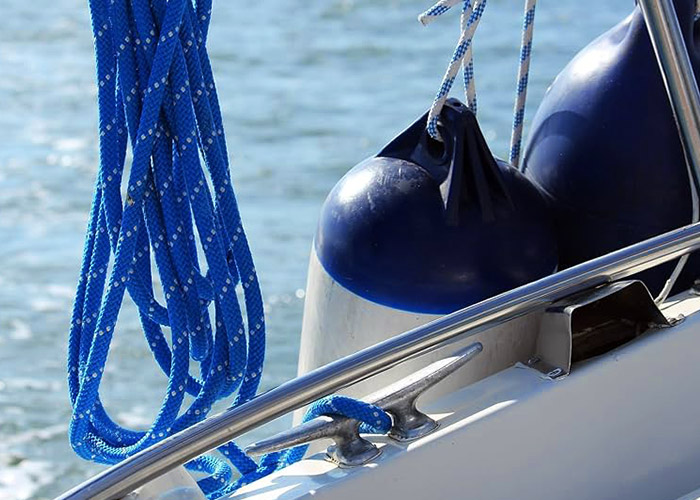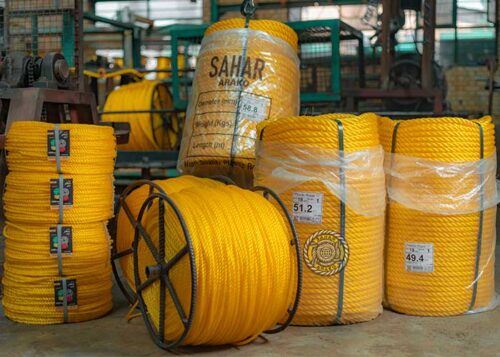Polypropylene rope is a type of synthetic rope made from polypropylene material. Thanks to its unique properties—such as being lightweight, resistant to moisture, and durable against various weather conditions—it is widely used in numerous industries and applications. Polypropylene is a thermoplastic polymer that is commonly used in the production of strong yet lightweight ropes. Compared to other ropes like nylon ropes, polypropylene ropes offer better tensile strength and overall resistance. This makes them particularly suitable for wet environments or areas with direct contact with water. In this article, we will take a closer look at the features and applications of polypropylene ropes.
What is Polypropylene Rope?
Polypropylene rope (PP rope) is extremely light and does not sink in water. These ropes are typically produced in three-strand and eight-strand braided forms, and are also known as marine ropes.
- Three-strand ropes are commonly used for mooring vessels, securing cargo on decks, towing ships from anchorage to docks, building rope ladders and gangways on naval vessels, lashing ships together, and in various fishing operations.
- Eight-strand braided ropes made of polypropylene are mostly used in the shipping and maritime industry for heavier-duty purposes.
Specifications of Polypropylene Rope
Polypropylene ropes are made from long continuous fibers of polypropylene, produced in various lengths. They are manufactured from high-quality petrochemical raw materials, ensuring purity and consistency. Since the fibers are synthetic, they possess unique physical and chemical properties.
When compared to polyethylene, polypropylene exhibits significantly different characteristics and is preferred for heavier industrial applications. Its higher strength makes it ideal for manufacturing ropes used in heavy-duty operations.
In addition, compared to natural fibers like hemp, polypropylene fibers offer several superior qualities, making them a preferred choice over polyethylene and hemp ropes.
Applications of Polypropylene Rope
Polypropylene ropes are versatile synthetic ropes with a wide range of applications. Some of their key advantages include:
- High abrasion resistance
- High tensile strength
- Ability to float on water
- Flexibility and easy handling
- UV resistance
- Water-resistant (does not absorb water)
- Resistant to corrosive elements in seawater (unlike wire ropes or natural fibers that corrode)
- Long lifespan with strong insulating capacity
Polypropylene ropes are widely used in:
- Marine and shipping industries
- Fishing and aquaculture
- Agriculture and farming
- Construction
- Oil drilling
- Military applications
Their resistance to peeling, corrosion, and fading also makes them reliable in harsh environments. However, factors like exposure to water, surface friction, and abrasion do influence their service life.
Why Choose PP Rope?
Polypropylene, the main material in these ropes, is a petrochemical-derived polymer with outstanding physical properties. It offers:
- High thermal resistance
- A glass-like solid structure upon cooling
- Excellent durability in harsh conditions
Compared to polyethylene, polypropylene performs better under stress and is more reliable for heavy-duty tasks. Polypropylene marine ropes are highly resistant to acids and can withstand melting temperatures up to 170°C.
Types of Polypropylene Rope
Polypropylene ropes are mainly available in:
- Three-strand ropes – commonly used for regular marine operations like mooring and rope bridges.
- Eight-strand braided ropes – stronger and designed for heavy marine and industrial uses.
Key Features of PP Rope
- Waterproof and buoyant
- High abrasion resistance
- Lightweight
- Acid- and alkali-resistant
- UV-protected
- Safe for human handling
- Resistant to moisture, rot, and mold
- Chemically resistant
Technical and Structural Properties
Polypropylene ropes are manufactured in diameters ranging from 2 mm to 44 mm. Depending on the application, they vary in weight and tensile strength. Their minimum breaking load (MBL) can reach up to 243 kN, proving their high load-bearing capacity.
Reinforcing Additives in PP Rope Production
During manufacturing, reinforcing materials such as talc or glass fibers may be added to enhance strength and durability. However, these additives must be carefully balanced in the formula to avoid reducing impact resistance.
Common Applications of Polypropylene Ropes
Polypropylene ropes are widely used in:
- Shipbuilding and marine industries
- Agriculture and livestock farming
- Construction and civil engineering
- Drilling industries
- Military uses
- Fishing and net making
Conclusion
Polypropylene rope is one of the most widely used rope products on the market. With its wide variety of types and sizes, exceptional durability, and adaptability to different environments, it has earned strong popularity among users across industries.



